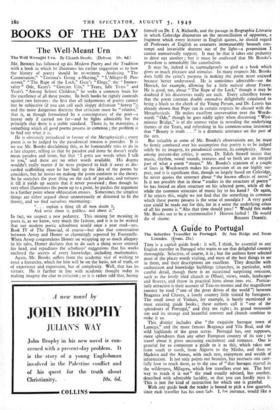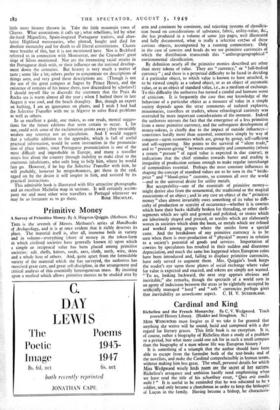A Guine to Portugal
THIS is a capital guide book: it will, I think, be essential to any English traveller in Portugal who wants to see that delightful country thoroughly. Selective, of course, it is ; but the authors have selected most'of the places worth visiting, and most of the best things to see in them, and their descriptions are excellent. They describe with enthusiasm and knowledge buildings (churches, in particular, with careful detail, though there is an occasional surprising omission, such as the lovely tiled church at Olhao), views, roads, landscapes and flowers, and throw in practical hints about inns. etc. Particu- larly attractive is their account of Tras-os-montes and the magnificent journey by road ("one of the great drives of the world ") between Braganca and Chaves, a lonely country little visited by foreigners. The small town of Vinhais, for example, is barely mentioned in most existing guide books ; these authors call it "one of the splendours of Portugal," and they are right ; its grand mountain site and its strange and beautiful convent and church combine to make it so.
This district includes also " the exquisite baroque town of Lamego," and the more famous Braganca and Vila Real, and the wild highlands of the great serras. Portugal has, one supposes, more splendours than any other European country of its size ; to travel about it gives unceasing excitement and romance. One is grateful for so competent a guide to it as this, which takes one from south to north, from Algarve to the Minho, and then to Madeira and the Azores, with such zest, enjoyment and wealth of information. It not only points out beauties, but instructs one care- fully how to reach them, as in the case of "that baroque marvel in the wilderness, Milagres, which few travellers ever sec. The best way to reach it is not" the road usually advised, but another, described with admirable lucidity, so that you can hardly miss it. This is just the kind of instruction for which one is grateful.
With any guide book the reader is bound to pick a few quarrels, since each traveller has his own fad'. I. fnr instance, would like a
little morc history thrown in. Take the little mountain town of Chaves. What associations it calls up ; what rebellions, led by what die-hard Miguclists, Spain-inspired Portuguese traitors, and abso- lutist Highland mercenaries, who plotted, fought and died for absolute monarchy and for death to all liberal constitutions. Chaves must breathe of this, but it is not mentioned here. Nor is Beckford referred to in connection with Montserrat, nor the Crusaders' great siege of Saves mentioned. Nor arc the interesting racial strains in the Portuguese dealt with, or their influence on the national develop- ment down the centuries. But history is very much a matter of taste ; some like a lot, others prefer to concentrate on descriptions of things seen, and very good these descriptions are. (Though is not the use of the great compass at Sagres by Prince Henry, and the existence of remains of his house there, now discredited by scholars?) I should myself like to discredit the statement that the Praia da Rocha sea is warm almost all the year ; when I bathed there in late August it was cool, and the beach draughty. But, though an expert on bathing, I am an ignoramus on plants, and I wish I had had the Selective Traveller with me in Algarve to solve floral problems as well as others.
In so excellent a guide, one makes, as one reads, mental sugges- tions for the future editions that seem certain to occur. I, for one, could wish some of the exclamation points away ; they invariably weaken any sentence not an ejaculation. And I would suggest that a valuable addition to the appendix, which is full of useful practical information, would be some instruction in the pronuncia- tion of place names, since Portuguese pronunciation is one of the most difficult and improbable in Europe, and many a traveller strays lost about the country through inability to make clear to the courteous inhabitants, who only long to help him, where he would fain go. However, if he has the Selective Traveller with him, he will probably, however he mispronounces, get there in the end, egged on by the desire it will inspire in him, and assisted by its practical instructions. This admirable book is illustrated with fifty attractive photographs and an excellent Michelin map in sections. It will certainly accom- pany me and most other wise travellers to Portugal whenever we
may be so fortunate as to go there. ROSE MACAULAY.



































 Previous page
Previous page